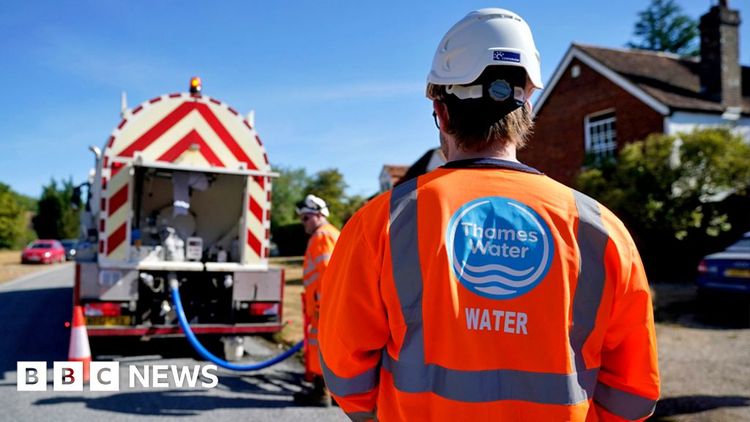Thames Water secures £750m cash injection

Source of image, PA Media
Investors in Thames Water have consented to contribute an additional £750m in financial backing while the company endeavors to counteract the risk of being taken under government supervision.

Thames additionally mentioned its intention to seek out an additional £2.5 billion from 2025 to 2030.
The water company has received backlash regarding the release of sewage and liquid leaks while also grappling with an overwhelming burden of debt.
The authorities have stated their preparedness to take action in the event of the company's downfall, should it occur.
Thames Water's upcoming prospects were brought to attention last month as reports surfaced about their discussions to acquire additional financial support, and their CEO, Sarah Bentley, resigned after a short tenure of two years.
There were rumors that if Thames, with its outstanding debts of approximately £14bn, failed to obtain new funding, the government might step in temporarily and take control until a new buyer is identified, under a specific administration procedure known as a special administration regime (SAR).
Bulb, the energy provider, recently encountered financial challenges which led to the adoption of this approach.
Nevertheless, Cathryn Ross, the appointed interim joint CEO of Thames, contradicted the notion of government intervention during her interview on BBC's Today programme, emphasizing that the company is nowhere near the point of needing such assistance.
According to her, the organization possessed a total of £4.4 billion in available funds and credit resources. "Without a doubt, this amount is sufficient to cover all our anticipated expenses for the current year, as well as the upcoming years."
Nevertheless, the sum of £750m that investors have agreed to inject into Thames over the next five years falls short of the desired £1bn by the company.
Thames Water is responsible for providing water to one-fourth of the population in the UK and unfortunately has a higher water leakage rate compared to other water companies in the country. Every day, they lose an amount of water that could fill up to 250 Olympic-sized swimming pools, due to the leaks in their pipes.
Thames Water recently received a penalty of £3.3m as a consequence of releasing countless litres of concentrated sewage into two rivers in Sussex and Surrey back in 2017, resulting in the demise of over 1,400 fish.
The ownership of the company is in the hands of a consortium of investors. The principal stakeholder is OMERS, a Canadian pension fund, with the Universities Superannuation Scheme, which caters to retirement benefits for academics in the UK, coming in next.
The water industry watchdog, Ofwat, is set to face scrutiny from Members of Parliament on Wednesday following allegations of insufficient vigilance in their supervision of the sector.
Over the weekend, Sir Robert Goodwill, a Conservative Member of Parliament who heads the Committee for Environment, Food and Rural Affairs, expressed to the BBC that the regulatory entity had displayed a significant lack of concern towards Thames Water. He raised doubts regarding their vigilance and inquired whether they had been negligent in fulfilling their responsibilities.
In the previous week, David Black, the CEO of Ofwat, provided testimony to a committee of Lords in the realm of business, where he expressed that Thames would require "considerable amounts of capital" to establish stability in its finances.
He also acknowledged that the governing body had employed a "comparatively non-interventionist attitude" towards overseeing water companies ever since the sector was privatized in the latter part of the 1980s.









































